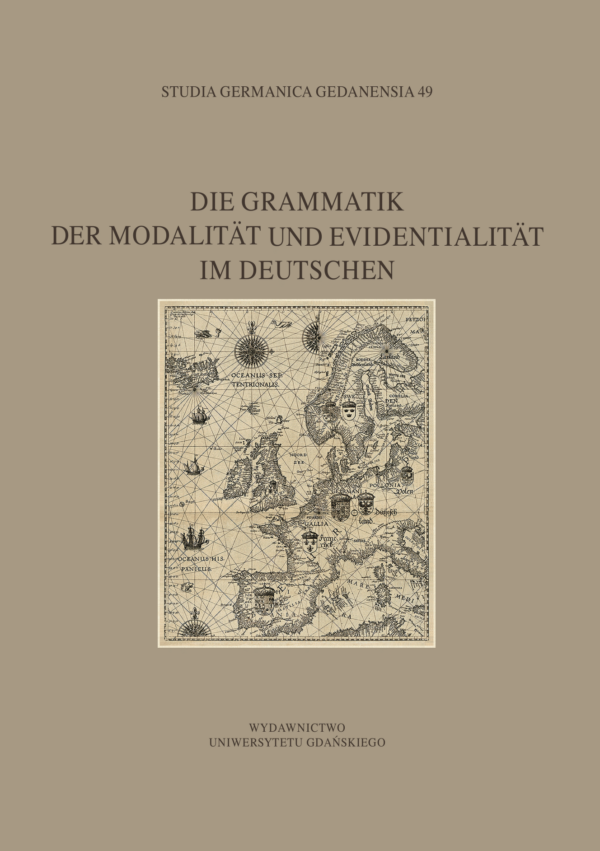Epistemic mag revisited: Assessing the (ir)relevance of propositions
DOI:
https://doi.org/10.26881/sgg.2023.49.02Słowa kluczowe:
Epistemicity, irrelevance judgements, modal verbs, mag, factualityAbstrakt
This paper investigates the epistemic use of the German modal mag. Recent studies have suggested that it might be developing into a concessive marker, possibly losing its epistemic component of assessing the factuality of a proposition. Using a corpus‑based analysis of its context features, this paper argues that mag still retains some of its epistemic characteristics and is functionally close to markers of irrelevance.
Downloads
Bibliografia
Baumann, Carolin (2017): Bedeutung und Gebrauch der deutschen Modalverben. Lexikalische Einheit als Basis kontextueller Vielheit (Linguistik – Impulse & Tendenzen). Berlin, Boston: de Gruyter.
Bybee, Joan / Perkins, Revere D. / Pagliuca, William (1994): The evolution of grammar. Tense, aspect, and modality in the languages of the world. Chicago: Chicago University Press.
Diewald, Gabriele (1999): Die Modalverben im Deutschen. Grammatikalisierung und Polyfunktionalität (= Germanistische Linguistik 208). Berlin: de Gruyter.
Diewald, Gabriele (2004): Faktizität und Evidentialität. Semantische Differenzierungen bei den Modal und Modalitätsverben im Deutschen. In: Oddleif Leirbukt (Hg.): Tempus/Temporalität und Modus/Modalität im Deutschen – auch in kontrastiver Perspektive. Internationales Kolloquium, 8. 9. September 2000, Bergen. Tübingen: Stauffenburg, 231–258.
Diewald, Gabriele (2009): Konstruktionen und Paradigmen. In: Zeitschrift für germanistische Lingu istik. 37 (3), 445–468.
Diewald, Gabriele (2013): Modus und Modalverben Kategorisierungsoptionen im grammatischen Kernbereich der Modalität. In: Werner Abraham, Elisabeth Leiss (Hg.): Funktionen von Modalität. Berlin: de Gruyter, 77–110.
Geyken, Alexander (2007): The DWDS corpus: A reference corpus for the German language of the 20th century. In: Christiane Fellbaum (Hg.): Collocations and idioms: Linguistic, lexicographic, and computational aspects. Corpus and discourse. Research in corpus and discourse. London, New York: Continuum, 23–41.
Haspelmath, Martin / König, Ekkehard (1998): Concessive conditionals in the languages of Europe. In: Johan van der Auwera (Hg.): Adverbial constructions in the languages of Europe (= Empirical approaches to language typology 3). Berlin: Mouton de Gruyter, 563–640.
Helbig, Gerhard / Buscha, Joachim (2017): Deutsche Grammatik. Ein Handbuch für den Ausländer unterricht. Stuttgart: Klett Langenscheidt.
Leuschner, Torsten (2006): Hypotaxis as building site. The emergence and grammaticalization of con cessive conditionals in English, German and Dutch. Teilw. zugl.: Berlin, Freie Univ., Diss., 2003. (= LINCOM studies in Germanic linguistics 24). München: Lincom Europa.
Leuschner, Torsten (2013): Was Partikeln wohl (auch immer) mit Gleichgültigkeit zu tun haben. In: Germanistische Mitteilungen. 39 (1): 37–62.
Leuschner, Torsten (2020): Concessive conditionals as a family of constructions. In: Belgian journal of linguistics. 34, 235–247.
Mortelmans, Tanja (2019): Das Modalverb dürfte in epistemischer Verwendung: Ergebnisse einer neuen Korpusstudie . In: Studia Germanica Gedanensia 41, 113–126.
Palmer, F. R. (20012 ): Mood and Modality. Cambridge Textbooks in Linguistics. Cambridge: Cambridge University Press.
Politt, Katja (2019): Verbale Konstruktionen in grammatischen Paradigmen. In: Dániel Czicza, Volodymyr Dekalo, Gabriele Diewald (Hg.), Varianz in der konstruktionalen Schematizität. Konstruk tionsgrammatik. VI, Tübingen: Stauffenburg, 217–236.
Politt, Katja (2022): Formen und Funktionen von Paradigmen (= Sprache – System und Tätigkeit 75). Berlin: Peter Lang.
Rossari, Corinne / Smirnova, Elena (2022): Post modal Concessive Meanings: A Contrastive Corpus Study of French and German Modal Verbs. In: Laura Baranzini, Louis d. Saussure (Hg.). Aspects of tenses, modality, and evidentiality (= Cahiers chronos 31). Leiden, Boston: Brill, 234–261.
Vander Haegen, Flor (2019): Die Emergenz irrelevanzkonditionaler Subjunktoren des Typs ‚egal was‘. Variation und Grammatikalisierung anhand des Deutschen Referenzkorpus. In: Germanistische Mitteilungen. 45 (1&2), 113–138.
Vander Haegen, Flor (2021): ‚Egal wer/was‘ Gefüge im DaF Unterricht. In: Germanistische Mittei lungen. 47, 263.
Vander Haegen, Flor / Bossuyt, Tom / Leuschner, Torsten (2022): Emerging into your family of constructions. German [IRR was] ‘no matter what’. In: Constructions and Frames 14 (1), 150–180.
Welke, Klaus (1965): Untersuchungen zum System der Modalverben in der deutschen Sprache der Gegen wart (= Schriften zur Phonetik, Sprachwissenschaft und Kommunikationsforschung 10). Berlin: Akademie Verlag.
Pobrania
Opublikowane
Jak cytować
Numer
Dział
Licencja
Copyright by Instytut Filologii Germańskiej, Wydawnictwo Uniwersytetu Gdańskiego.

 Uniwersyteckie Czasopisma Naukowe
Uniwersyteckie Czasopisma Naukowe




